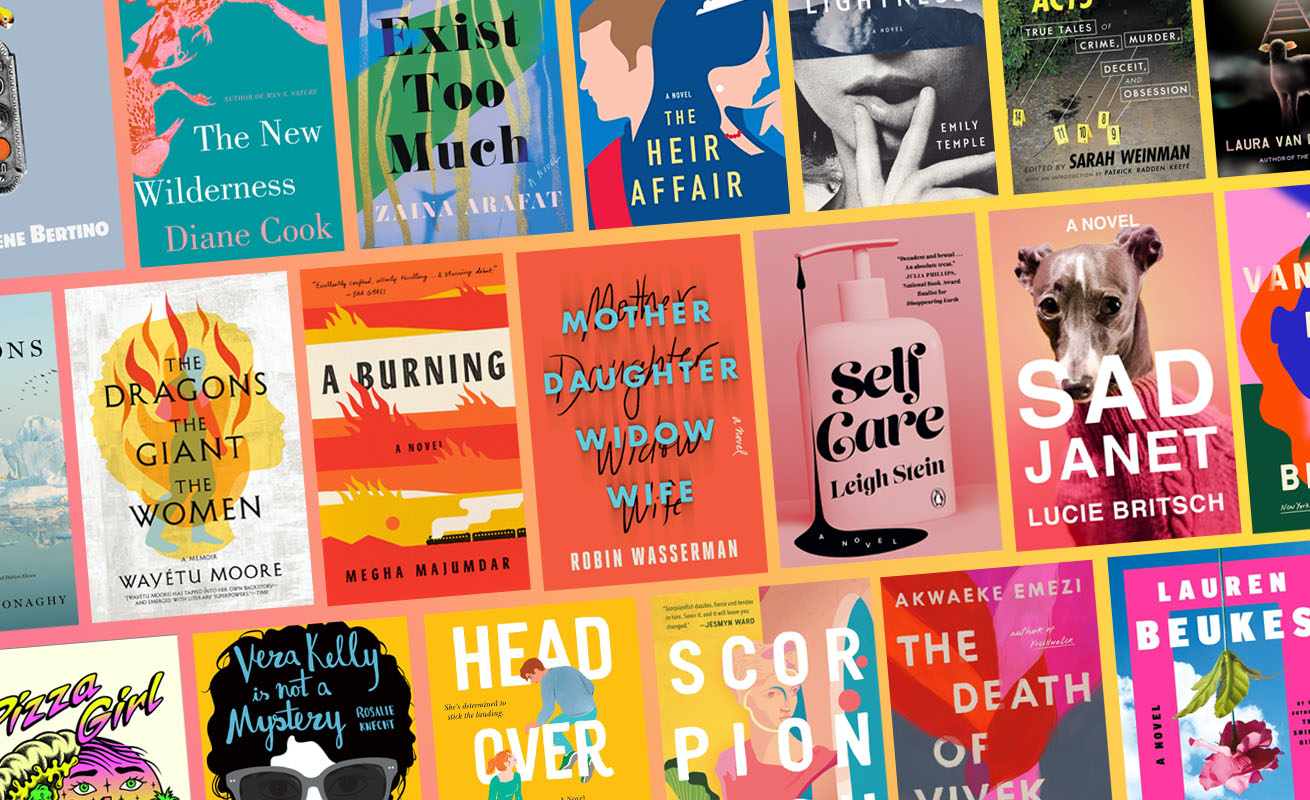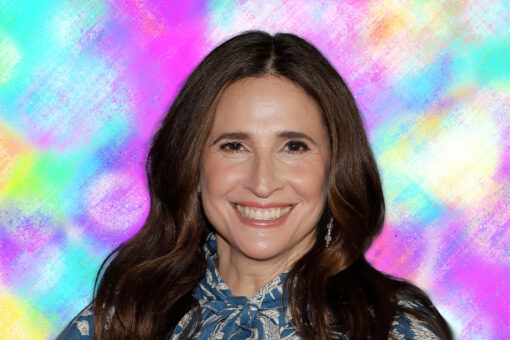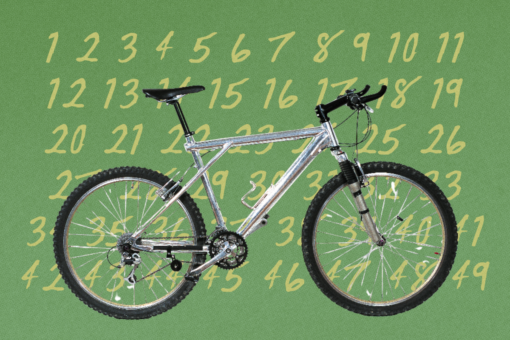We have no idea what this summer is going to look like. As I write this books preview in May, our world has been turned upside-down with the onset of the COVID-19 pandemic. None of these authors could have imagined that their books would be released as the world is dealing with a global health crisis; yet, here they are. Here we are.
So you may not be reading your summer books where you traditionally read summer books — on a hot subway, at your grandparent’s house, on the beach — but that is okay. Summer books are versatile. Summer books can be read anywhere. And while everyone has their own idea of what a “summer book” should look like, I am here to tell you: throw all your preconceived notions out the door. Anything can be a summer book! Last year, Emma Copley Eisenberg made the case on Alma that Sophie’s Choice by William Styron is the perfect summer read.
So, among our picks for books coming out this summer 2020, there are romances and mysteries and memoirs and comic novels and tragic novels and climate change dystopias. I promise you: There is something for everyone. (If you want books you can get now, may I suggest our spring 2020 list?). Before we get to the books — a really exciting programming note! — we’re on Bookshop now!! All our get it here links will now direct you to bookshop.org, a platform that supports local, independent bookstores. And you can shop this list directly on Bookshop, here.
So, in no particular order, here are 31 books you should read this summer:
1. Self Care by Leigh Stein (June)
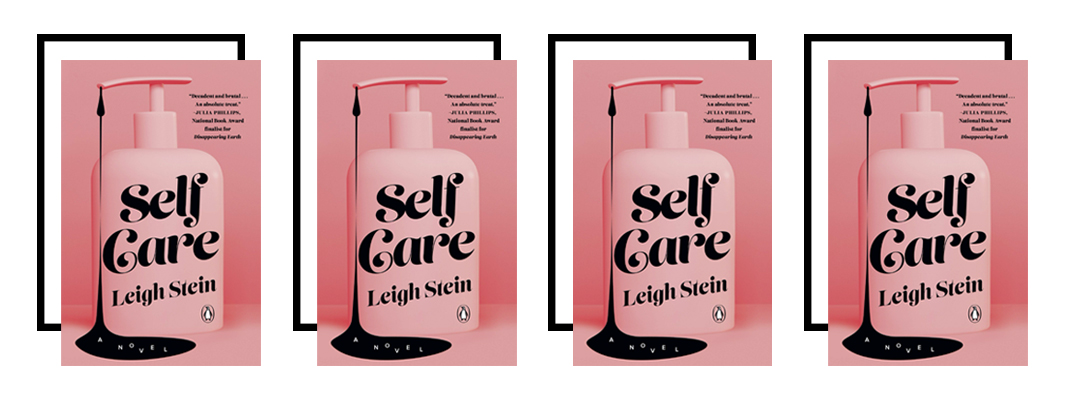
Leigh Stein’s novel Self Care is an incisive satire of the wellness industry, and it is so damn good. I started reading, kept reading, and didn’t look up until I was done. There is so much to applaud about Stein’s novel — the way she dives into #girlboss founders, performative wokeness, “feel-good feminism,” #MeToo, and so much more — you come away in disbelief that she juggled everything so well. It’s scathing and smart and the details she gets in there feel like they could exist in our world, even though it’s fully fictional. As Maris Kreizman, a book reviewer and writer I greatly admire, tweeted, “This novel is absolutely vicious, and I say that with much respect.” Amen to that.
Self Care is a dark, satirical look at what it means to be a millennial woman online — and to capitalize on being a millennial woman online. There are three narrators: Maren and Devin, who are the co-founders of a self-care social media platform, and Khadijah, their first hire. The three women lead dramatically different lives, with different views on the internet and feminism and everything in between. A juicy, funny, smart read. Did I already say it was a smart read? Leigh Stein is so smart and so understanding of the internet I am in awe.
Read if you’re into: “vicious” (!!) novels, satire, millennials, observations on wellness culture. Get it here.
2. The Heir Affair by Heather Cocks & Jessica Morgan (July)
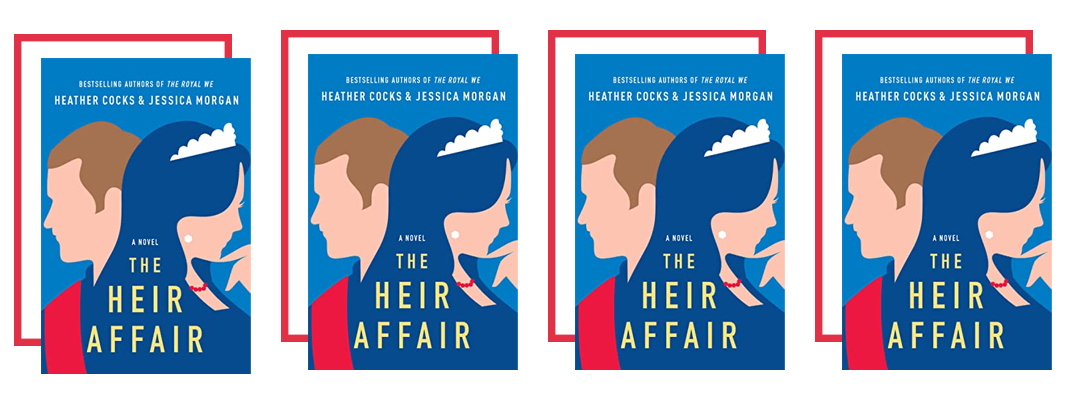
Once you start The Heir Affair, be prepared to not be able to put it down. Seriously. This book is addictive in all the best ways. Like many, I have been waiting for Heather Cocks and Jessica Morgan’s highly anticipated sequel to The Royal We. In their first novel, American Bex Porter falls for Nick, the British prince who is in line to the throne, and drama ensues. (It was actually based more loosely on Kate & Will than Meghan & Harry, FYI). After a scandal turns their fairy tale into a nightmare, Bex and Nick have to deal with the fallout. That’s where The Heir Affair begins, but then it turns into so much more than that — Cocks and Morgan have crafted a delicious story of complicated families, it’s just that this one happens to be royal. If you haven’t read The Royal We yet, go read that, then read this. You won’t regret it, I promise.
Read if you’re into: royals. Gossip. Drama. Complicated families. Compulsively readable books. This has literally everything!!! Get it here.
3. Party of Two by Jasmine Guillory (June)
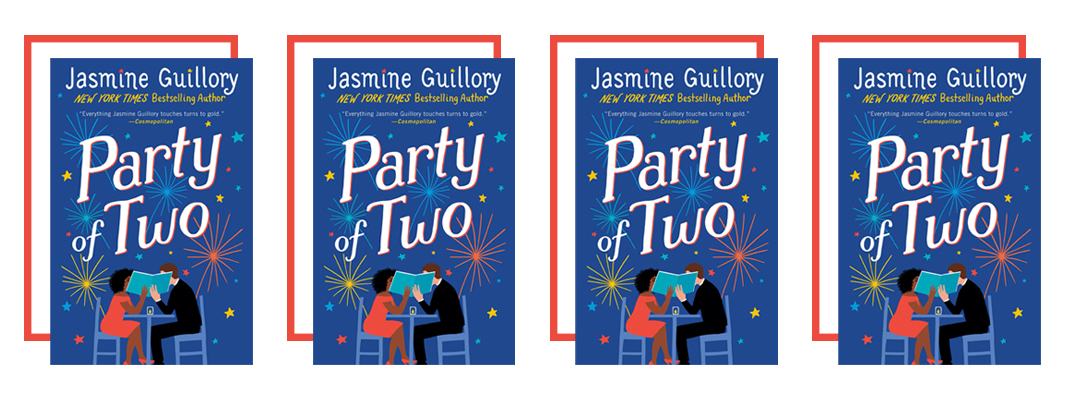
Speaking of romances you will stay up all night reading, the latest Jasmine Guillory romance does NOT disappoint!! (She never disappoints, tbh.) The story centers on a woman, Olivia, who feels so real – she is an ambitious lawyer who moves to L.A. to launch her own law firm. One night shortly after her move, she is at a hotel bar when she meets a handsome man, and they obviously have instant chemistry. She sorta recognizes him, but not enough, and when she gets back to her hotel room she turns on the TV and realizes the man she had been flirting with was a junior senator from California. This sets up the plot of Party of Two, which I won’t spoil any further: It’s delightful, smart, addresses interracial dating, and captures what feels like a very real adult relationship. What more could you want!?
Read if you’re into: love stories, duhhhhhhh. Get it here.
4. The Vanishing Half by Brit Bennett (June)

Identical twin sisters Stella and Desiree are born and raised in the fictional town of Mallard, Louisiana, a community of light-skinned Black Americans. (The slave-born founder of the town imagined a place “each generation lighter than the one before.”) As young girls in the 1940s, they witness their father’s lynching — and at age 16, they run away to New Orleans in search of a different life. The girls end up in different worlds; Desiree returns home to their Black community with her daughter, and Stella has left her blackness behind, passing for white, marrying a white man, and raising a white daughter. The sisters, and their daughters, are so well constructed and the story is so well told — The Vanishing Half is sure to be a classic in the years to come.
Read if you’re into: complex stories of sisterhood, family, and race. Get it here.
5. You Exist Too Much by Zaina Arafat (June)
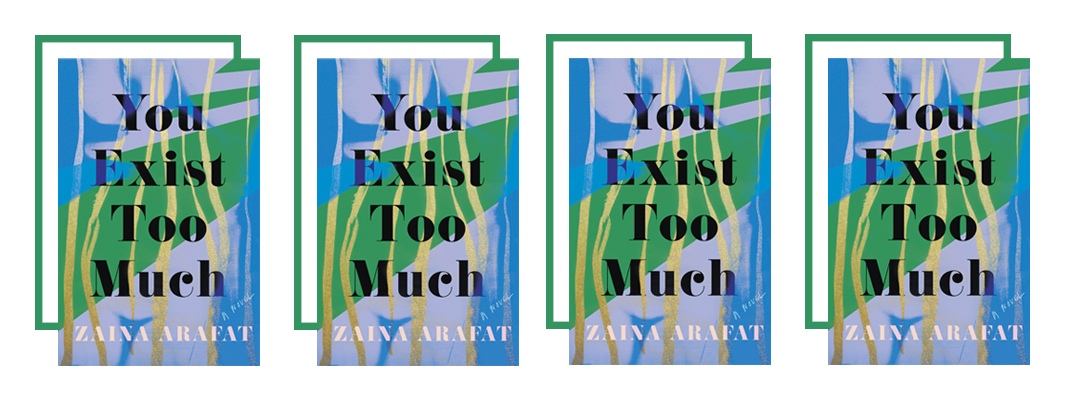
You Exist Too Much is Zaina Arafat’s debut novel, a powerful and moving story of a bisexual Palestinian American navigating her love addiction and queer identity. The title comes from a phrase the narrator’s mother tells her — “You exist too much” — and from the built-up years of resenting her body, her sexuality, and her mother. After aimlessly working as a DJ and trying to become a writer, she goes through an awful break-up and decides to check herself into rehab for love addiction. I loved this description from Elle: “For anyone who’s ever felt their body or identity takes up too much space, this deeply affecting story of doubt and and love is a gut-punch and a solace.” A gut-punch and a solace. I am stealing that, Elle, to describe all books I find at once challenging and comforting. Most of the story is told through flashbacks as the narrator is in treatment, trying to work on her issues and figure herself out. The flashbacks are where Arafat shines — bringing us from Beirut to the West Bank to the D.C. suburbs to Florence, showing us where things kept going wrong.
Read if you’re into: stories that are a gut-punch and a solace!! Get it here.
6. The Lightness by Emily Temple (June)

At the Levitation Center, a Buddhist retreat, there’s a summer program for troubled teens. The Lightness centers on one such troubled teen: Olivia, who ran away from home to attend the program. The Levitation Center was the last place where she knows her dad was. Her dad, who was super into Buddhism, always tried to teach his daughter his beliefs. Now, at summer camp, she falls in with three other girls — led by a mysterious camper who has been at the Levitation Center forever, Serena — who want to learn how to levitate. As Olivia narrates, “Even before I understand what Serena was really after, the appeal of levitation was obvious to me. Every girl wants more from the world. Every girl wants magic, to transcend the mundanity of her life. Every girl wants power, and Serena more than most.” There were so many quotes I highlighted as I read, just thinking to myself, oh fuck yes.
Read if you’re into: stories of girlhood, of girls on the cusp of adulthood, Buddhism, thrillers. Get it here.
7. The New Queer Conscience by Adam Eli (June)

Activist, writer, and Voices4 founder Adam Eli (you may know him from Instagram, @adameli) wrote a book on queerness and activism!! The New Queer Conscience is part of the Pocket Change Collective, “a series of small books with big ideas,” published by Penguin Teen. But we promise this one is not just for teens; The New Queer Conscience is necessary reading for everyone. Eli draws on his background as an activist, and on his Jewish and queer identities, to write this important manifesto about how “queer people anywhere are responsible for queer people everywhere.” The book is dedicated to his “grandmothers Freda Braunstein, Rita Werner, and all of the women, queer and not, Jewish and not, who make the world go round.” Hell, yes!! Eli takes his readers by the hand on a journey through his adolescence growing up queer in an Orthodox Jewish community, and his own understanding of what being queer means today.
“You are loved,” he writes near the beginning, “and you are welcome here.” What a beautiful sentiment to include in your book. Love you too, Adam.
Read if you’re into: queer Jews, thinking about Judaism and activism, and so, so much more. Get it here.
8. Scorpionfish by Natalie Bakopoulos (July)
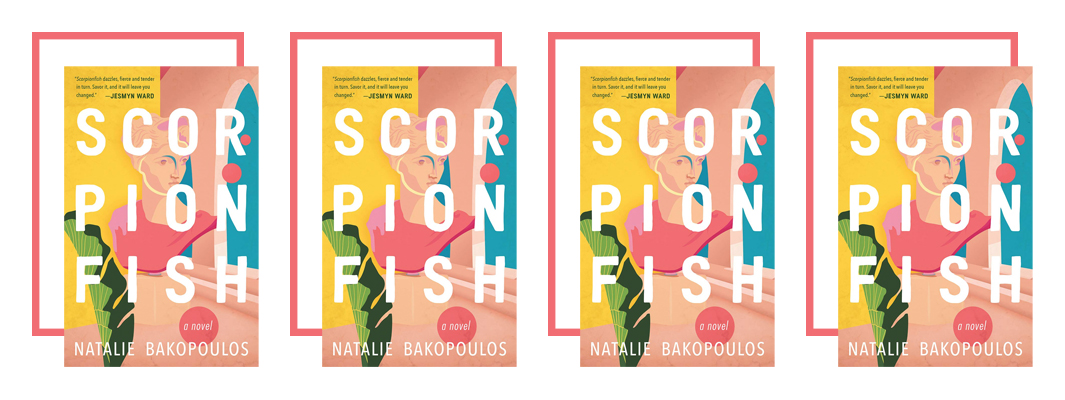
Now this is a novel where you can practically taste summer on its pages. I know I wrote above that I don’t believe in the concept of “summer books,” but this, my friends, is a summer book. Natalie Bakopoulos has crafted a magnetic story of a summer in Greece — filled with art, love, and loss — centering on two mesmerizing characters: a woman named Mira, and a man just called “the Captain.” After the tragic death of her parents, Mira returns to her childhood home in Athens, Greece. Next door lives the Captain, a former ship captain who is no longer at sea and dealing with a messy divorce. They speak across their balconies, forming a shared intimacy in the night. Mira had returned to Athens expecting to clean out her parents’ apartment, stay with her boyfriend, Aris, a Greek politician, and then return to her life as an academic in Chicago — but nothing goes according to plan. She soon falls back in with her friends, Dmitria and Fady, a couple caring for a Syrian refugee boy, and Nefeli, her aunt’s lover of many years who is working on a new art installment.
I just love how Tin House, the publisher, describes Scorpionfish: “Scorpionfish is a map of how and where we find our true selves: in the pull of the sea; the sway of late-night bar music; the risk and promise of art; and in the sparkling, electric, summertime charge of endless possibility.” Sign me up.
Read if you’re into: summer stories in the summertime, richly drawn characters, complex love stories. Get it here.
9. Pizza Girl by Jean Kyoung Frazier (June)
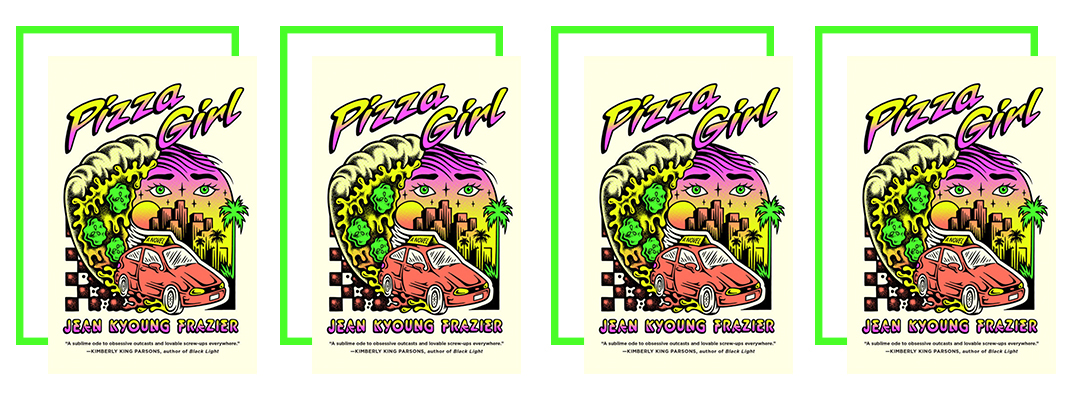
In Jean Kyoung Frazier’s novel, a pregnant 18-year-old pizza delivery girl (unnamed until the end of the novel) is nearing the end of her first trimester. She’s aimless, living with her boyfriend and her mom, and in denial about her pregnancy. One day, a stay-at-home mom, Jenny, calls the pizza place and asks for pizza with pickles and pepperoni. Soon, our delivery girl and Jenny strike up a weird friendship — friendship is maybe a loose term; our narrator becomes obsessed with Jenny. As she continues to spiral, she starts avoiding her boyfriend and continues to refuse to acknowledge her pregnancy or a future where she has a baby. It’s sad and funny and tender and hit all the right notes — even if some of those notes were oh no baby what are you doing?! Frazier makes you feel all the feelings with her unforgettable pizza girl.
Read if you’re into: feelings, dark humor, stories set in L.A. Get it here.
10. A Burning by Megha Majumdar (June)
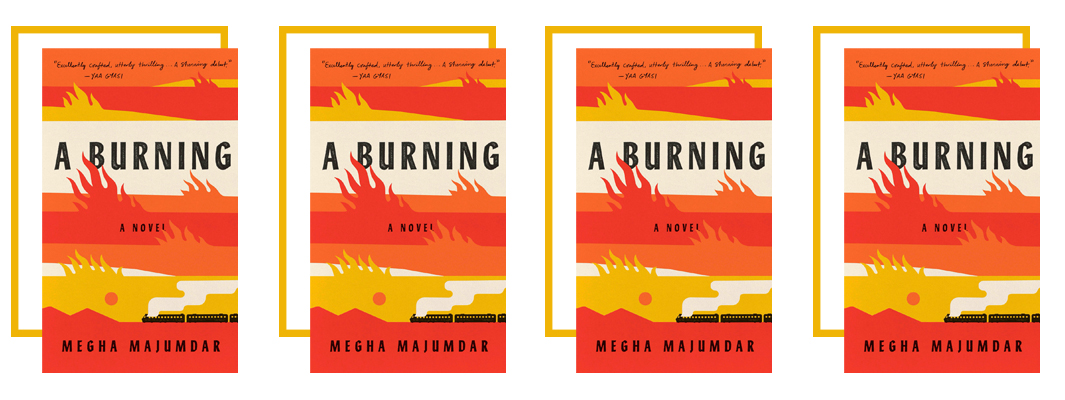
At the beginning of Megha Majumdar’s novel, terrorists in Kolabagan, India blow up a train, killing over 100 people. It’s terrible and awful — and everyone turns to Facebook to discuss it. At her parents’ house in the slums, Jivan shares a video of a woman being interviewed on the news about how the policemen just stood and watched. She adds her thoughts. The next morning, she is arrested and accused of collaborating with the terrorists. Jivan proclaims her innocence, saying she couldn’t have been involved — she was teaching English to a woman named Lovely — but no one listens. Soon, we’re introduced to the other two perspectives in A Burning: Lovely, a woman of trans experience who dreams of becoming an actress, and PT Sir, Jivan’s former gym teacher who is opportunistic and falls in with an emergent right-wing party. Majumdar writes with such heart, and such a clear understanding of the socio-economic and political dimensions of the story, that it is hard not to get caught up in everything while reading this book.
Read if you’re into: political novels with heart, nuanced characters, bittersweet and tragic stories. Get it here.
11. Sad Janet by Lucie Britsch (June)
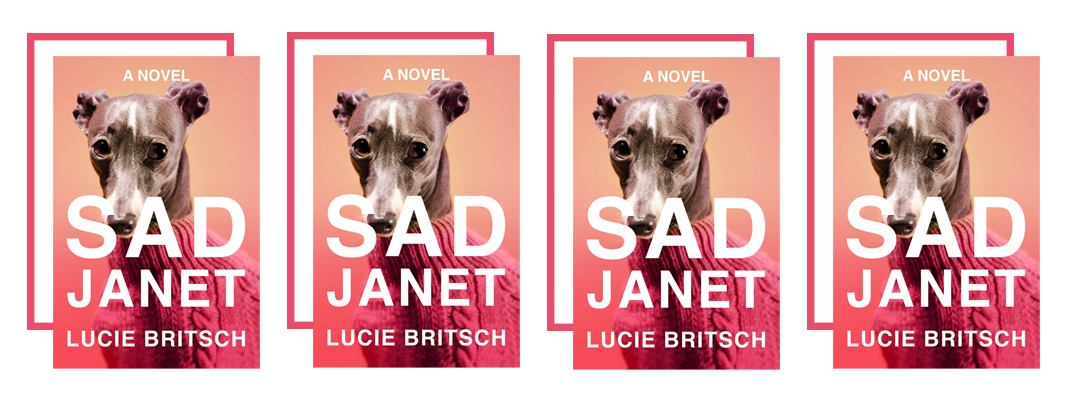
Lucie Britsch’s Sad Janet tells the tale of Janet. Who is, yes, sad. Janet, who works at an animal shelter, has no intention of trying to be happy. Her family and boyfriend try to intervene, trying to convince her to go on anti-depressants, but she refuses. She finally gives in, one day, when her doctor recommends a “Christmas Pill” — a pill you start taking eight weeks before Christmas, so by the time you get to the holiday, it is tolerable. Janet is supremely self-aware, and this is what propels the novel; she knows that she is sad, she knows she is depressed, but she just doesn’t want to do anything about it. She likes her life. It is funny and touching and highlights some very real truths about what it means to be a sad woman in our world.
Read if you’re into: darkly comic books. Seriously. This is very much up your alley. Get it here.
12. I Hold a Wolf By the Ears by Laura Van Den Berg (July)
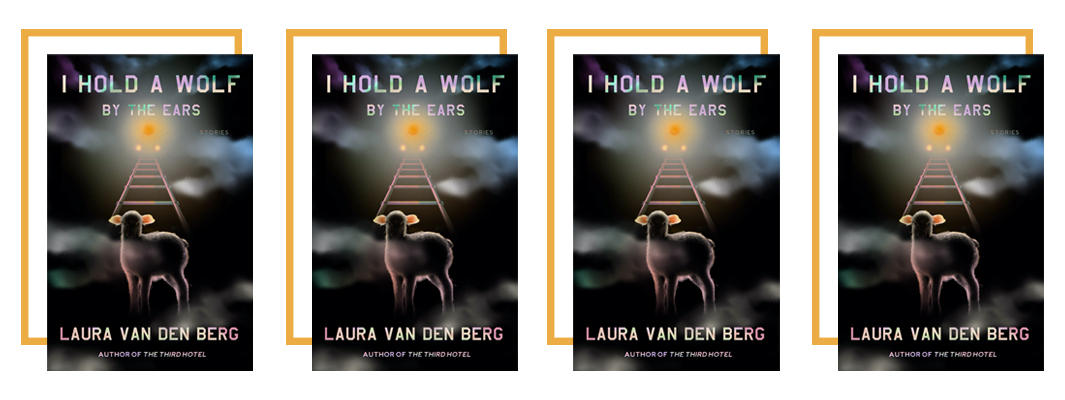
I adored Laura Van Den Berg’s novel, The Third Hotel, so I was super excited for her collection of short stories, I Hold a Wolf By the Ears, touted as “an urgent and unsettling collection of women on the verge.” (Once again, I say: sign me up!) The collection does not disappoint, often digging into political topics — primarily, the ways misogyny harms — in smart and nuanced ways. My favorite was “Volcano House,” the story of two sisters who travel to Iceland, where one sister is struck by a bullet in a mass shooting in a park. Van Den Berg’s writing is so captivating and incisive, particularly when dealing with horrific topics.
Read if you’re into: short stories, ghost stories, stories that center complicated women. Get it here.
13. Unspeakable Acts by Sarah Weinman (July)
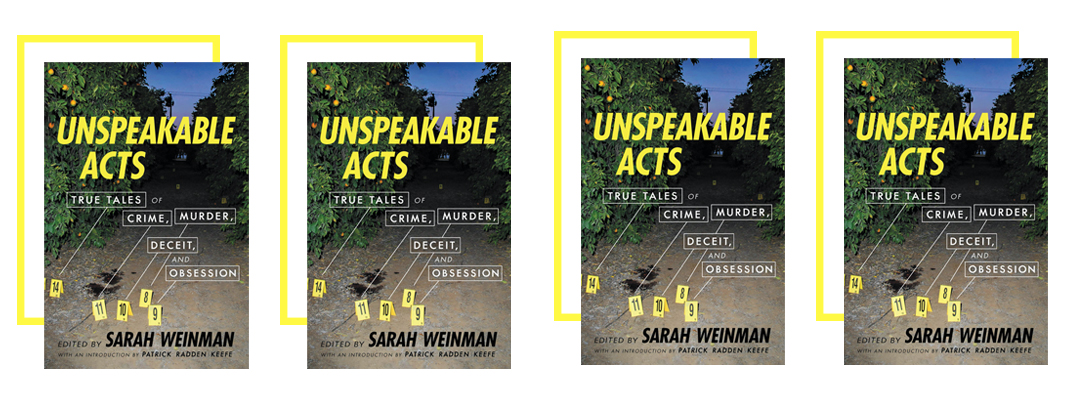
Jewish crime writer Sarah Weinman is back, and I for one couldn’t be more excited. Unspeakable Acts is dedicated to “those who find meaning, solace, catharsis, and outrage in crime stories, which is all of us.” This anthology highlights a wide spectrum of voices, where Weinman spotlights a new crop of true crime writers — ones who, as she writes, “centered the victims as human beings rather than rely on the trope of beautiful white dead girls,” ones who have an intersectional approach to their writing and understanding of crime, and ones who are women and people of color. Weinman expands the idea of what a crime story is — one of the stories is about a woman who treats gunshot wounds, and one on a woman who faced brutality at the hands of U.S. Customs and Border Protection. There’s also a dive into the disappearance of Sage Smith, a Black trans woman living in Charlottesville, and a fresh perspective on Ted Bundy, among other stories.
When I chatted with Weinman around the publication of her last book, The Real Lolita: The Kidnapping of Sally Horner and the Novel that Scandalized the World, she told me that “true crime is less about a gender issue; it’s a very white field. And you see that in terms of what kind of stories get highlighted… I feel like, I know the stories I’m best equipped to tell. But I want many, many more stories from different communities and those are the ones that I want to make a point of seeking out.” And seek them out she did; you won’t want to miss this collection of stories.
Read if you’re into: weird to say if you’re into true crime but… you know who you are. Read if you’re into true crime. Get it here.
14. Afterland by Lauren Beukes (July)
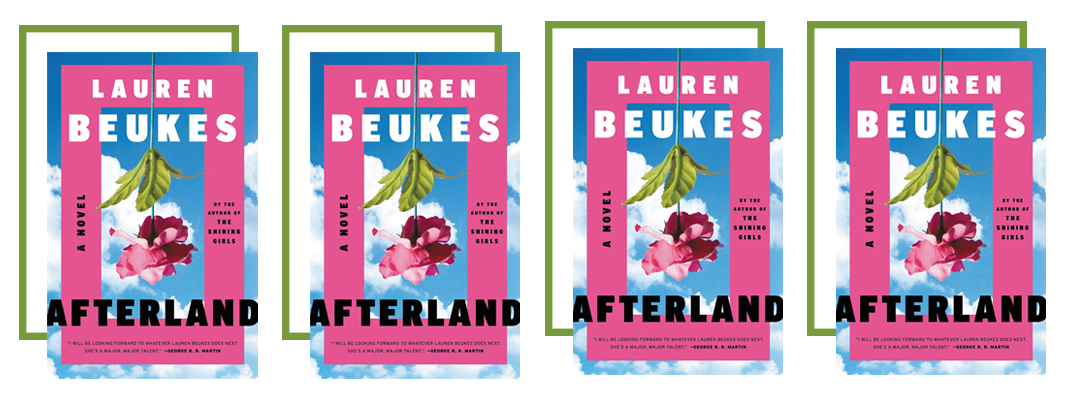
In Lauren Beukes’ dystopian novel, a mysterious flu pandemic hits the world in 2020. (Gulp.) The flu kills the majority of the world’s men, leaving very few boys and men left alive. One is 12-year-old Miles, born to a white South African mom and Black American dad. They are in America when the pandemic hits, and are unable to get home to South Africa. The Department of Men locks Miles up in a bunker, quarantining him for his safety. The bulk of the story takes place three years post the “Manfall,” when Miles’s mom, Cole, breaks him out of the bunker and tries to find a way for the two of them to get back home to South Africa. As men are super valuable in this new world, a whole host of characters are after Miles — including Cole’s sister, Billie. I was high-key very, very stressed reading Afterland — but that is the point: It’s a stressful world Cole and Miles are living in! Beukes expertly writes tension and trauma.
Read if you’re into: thrillers, dystopias. Again, you know who you are. Get it here.
15. Head Over Heels by Hannah Orenstein (June)
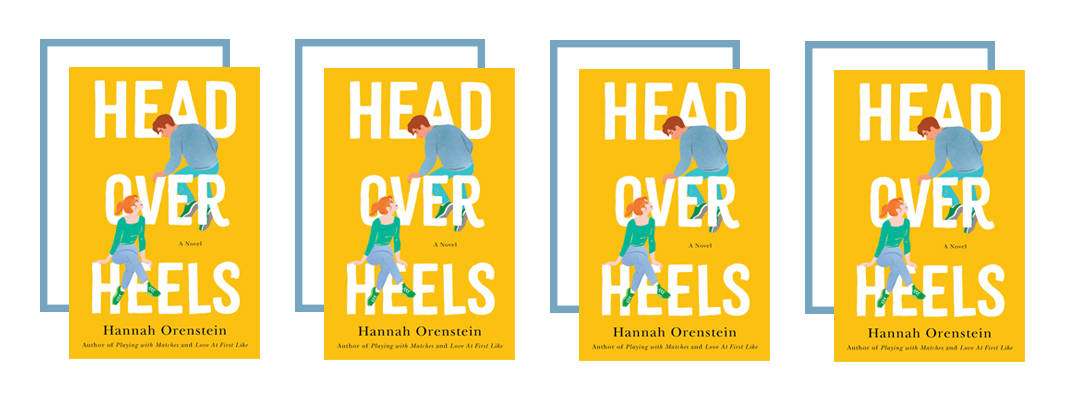
Head Over Heals is very loosely based on Aly Raisman’s life, if Aly Raisman hadn’t made the 2012 Olympic team, and dated a football player much more successful than Colton Underwood. Hannah Orenstein’s newest romance novel tells the story of Avery, a Jewish gymnast who gets injured during the Olympic trials and sees all her dreams spiral away from her. She ends up in L.A., fails out of college, and starts partying hard, until she meets Tyler, a back-up quarterback for the L.A. Rams. Fast forward (that was all in the first few chapters) and Tyler and Avery have broken up, and Avery is moving back home to a Boston suburb with her parents. She has no purpose, no goals, until she’s offered an assistant coaching position for a local girl who is an Olympic hopeful. It doesn’t hurt that her head coach is ridiculously cute.
It’s a bit weird to read now, during a pandemic, when they are prepping for the 2020 Olympics (Olympics that have been delayed a year in real life), but it is fun to imagine this alternative 2020. Head Over Heels isn’t just a romance; it dives into questions of abusive coaches and doctors in gymnastics, what it means for these young girls to push their bodies to the limits, and what you do when your dreams of Olympic glory disappear in an instant.
Read if you’re into: Aly Raisman! Jk (sorta), but read if you’re into romance stories, happy endings, and the Olympics. Who doesn’t love the Olympics?! Get it here.
16. The Dragons, The Giant, The Women by Wayétu Moore (June)

Wayétu Moore’s stunning memoir begins with an epigraph from the one and only Carrie Fisher: “Take your broken heart, make it into art.” And that’s exactly what Moore does over the next 250-odd pages. Wayétu was born and raised in Liberia; when she was only 5 years old, her family fled from their home to her grandmother’s rural village. Eventually, Wayétu and her family flee to Sierra Leone — her mother had been studying at Columbia in New York City, and pays a rebel fighter to get them across the border — and then they end up in Houston, Texas. Moore’s first book (which I loved), She Would Be King, came out in September 2019 — it retells Liberia’s origin story through a magical realism lens. Now, Moore is telling her own story.
Split into three sections, the first is Moore’s childhood fleeing during the Liberian Civil War; the second, her adult life trying to understand what being Black in America means, and dealing with the trauma of her childhood; and third, her mother’s story on how she went to New York and got her family across the border. A gripping, powerful memoir you won’t want to miss.
Read if you’re into: memoirs, histories you likely don’t know (but maybe you do know them, in which case, learning more about history you already knew…), the power of moms. Get it here.
17. Parakeet by Marie-Helene Bertino (June)
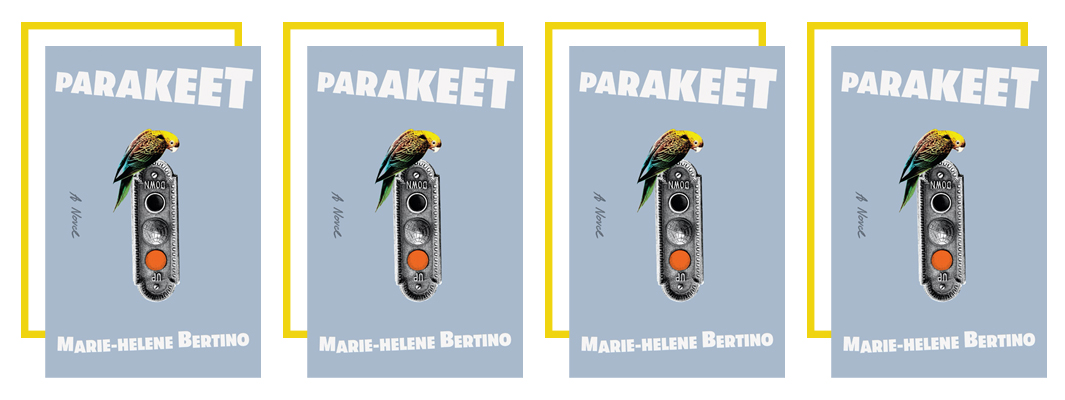
A week before her wedding day, our narrator returns to her hotel room and a small bird, a parakeet, is sitting in her room. With absolute clarity, the narrator knows the small bird is her grandmother — and so begins Parakeet, the weird (in a good way!) and surrealist novel by Marie-Helene Bertino. We are soon taken on a journey throughout her week as the narrator teeters on a nervous breakdown ahead of her wedding. It’s hinted that she’s been through major trauma — when you find out what happens, it’s brutal and awful — and Parakeet captures the frantic, fragmented life of the narrator. She is simply trying to do her best with the cards she has been dealt, and navigate her own tumultuous brain. I love how Kirkus puts it: “A vivid book about lives visited by violent strangeness but lived with authentic humor and hope.”
Read if you’re into: I’m not sure how to sum this one up… perhaps, books that deal with trauma and family and grief and breakdowns. Get it here.
18. The Happily Ever After: A Memoir of an Unlikely Romance Novelist by Avi Steinberg
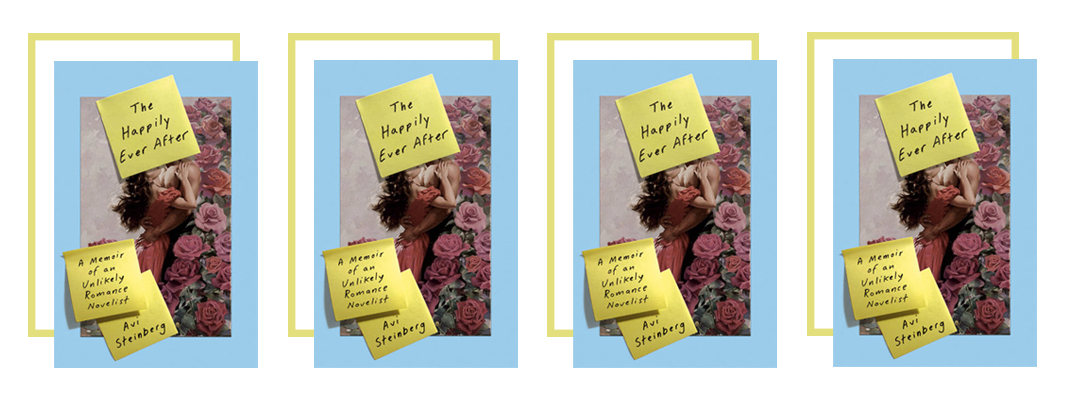
Jewish memoirist Avi Steinberg decides to explore the romance genre after his falls apart. What results? The Happily Ever After, a funny and heartfelt look into the world’s most popular genre. Steinberg takes us from a game of Jewish geography at his rabbinical divorce court to the rise of the Amish romance genre to his romance writing group with two Lindas (Linda2 is a bitch; Linda1 is fine). Steinberg is aware of his own privileges entering the genre as a white, cis man, and seeks out as many people as possible to understand the rules and nuances of romance.
Meanwhile, he’s trying to figure out his own life — and find his own “HEA” (Happily Ever After, naturally). When he starts telling people he was getting into romance, he writes about the negative reaction he would often receive — before people would share how romance stories impacted their own lives. I wish he dived more into the world of fanfiction (speaking as a big fan of Harry Potter fanfiction, a fact Steinberg’s memoir has made me decide not to be ashamed of) and addressed more of the issues of racism within the romance world, but overall, I loved this look into romance and the writer’s own issues with love.
Read if you’re into: happily ever afters, le duh. Get it here.
19. Tomboyland: Essays by Melissa Faliveno (August)
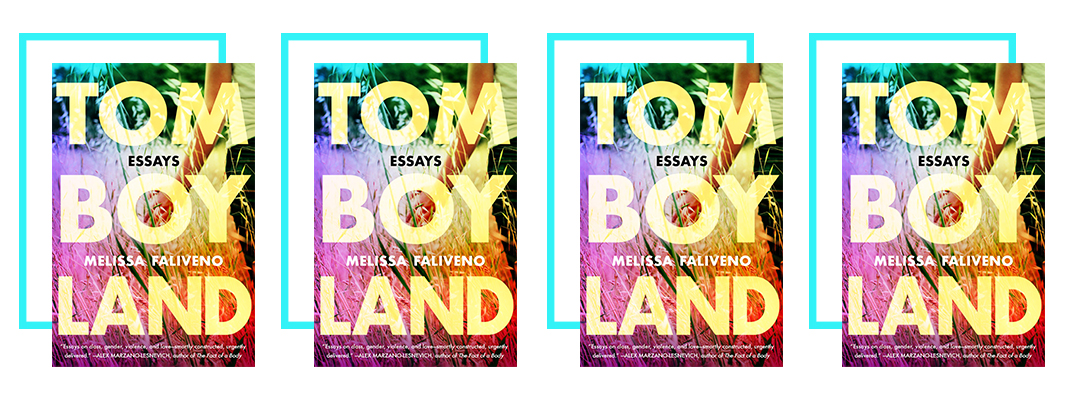
Melissa Faliveno’s debut essay collection, Tomboyland, is rooted in her childhood in Wisconsin and her adult life in New York City. Faliveno expertly addresses a wide range of topics — from her own gender identity to tornados to the BDSM/kink community to an essay about gun owners written from a lens I have never read before. My favorite essay, however, was “Switch-Hitter,” where Faliveno writes about her relationship to athletics, and playing softball and roller derby. It turns into a meditation on her obsession with perfection, and her subsequent spiraling into heavy alcohol use. What I loved was her ability to weave all these strands of her life together — failing to make the Div I. college softball team, about an assault she still can’t call rape, about finding queer community in roller derby — and it’s just a wonder to read. Bravo.
Read if you’re into: essay collections on queerness, the Midwest, gender, and everything in between. Get it here.
20. Migrations by Charlotte McConaghy (August)
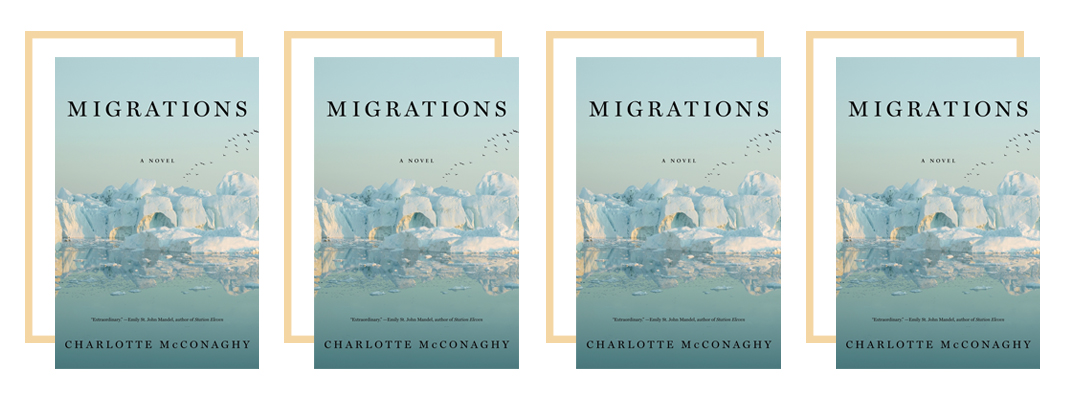
Oh man, Migrations is a brutal and beautiful novel. Charlotte McConaghy has crafted a story that is at once about climate change and how we are destroying the planet but also about one woman’s self-destruction. Migrations is the story of Franny Stone, an Irish-Australian woman who wants to track the last flight of the Arctic terns — birds who migrate from the North Pole to Antarctica. She somehow ends up on a fishing ship with a motley crew led by the eccentric captain, Ennis, and they follow the birds south. Throughout, there are flashbacks to Franny’s life with her husband, Niall, an ornithologist, and hints that something very dark and awful has happened to Franny — she is clearly a woman on the brink. Migrations is a finely crafted narrative that strings you along until the final moments.
Read if you’re into: stories about climate change, violence, and obsession. Get it here.
21. Empire of Wild by Cherie Dimaline (July)
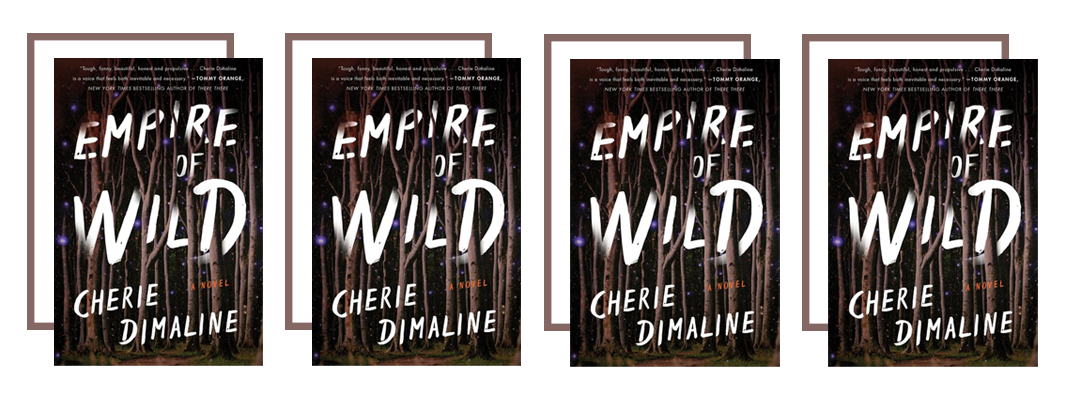
Cherie Dimaline’s wildly — no pun intended! — inventive novel, Empire of Wild, is a retelling of the traditional Métis legend of the rogarou, a werewolf-like creature. The Métis people are an Indigenous people of North America that trace their ancestry to mixed Indigenous and settler relations. The main plot of Empire of Wild is that Joan’s husband Victor disappears from their Métis town in Ontario. After nearly a year of searching for him, she finds him preaching in a revival tent — but he has no memory of who she is, or who he is. Dimaline, a Métis author, is known for her young adult books — this is her first adult novel, and she expertly weaves the modern with the traditional. For example: The sinister creature controlling her husband is doing it because he was hired by people who want to build an oil pipeline through ancestral lands. There are many different strands in this story — it’s at once a thriller, a meditation on modern geopolitics, and a dive into Indigenous history — yet Dimaline makes it fit together perfectly.
Read if you’re into: Indigenous stories, retellings of myth, books that address political topics. Get it here.
22. The Sprawl: Reconsidering the Weird American Suburbs by Jason Diamond (August)

In the introduction to The Sprawl, Jewish writer Jason Diamond explains that it took him a long time to admit he was from the suburbs. When someone asked where he was from, he writes, he would just say, “Chicago,” not the suburban town where he was actually raised. (Jason: I do the same thing. “New York” is better than “a suburban town in Westchester.”) What follows is a smart and deeply engaging dive into the American suburbs; Diamond sets out to understand both the history and exclusionary nature of the suburbs, the influence suburbs have had on American culture, and his own relationship to suburbia. As I read it, during this global pandemic when so many 20 and 30-somethings have fled cities for their parents’ suburban homes — including myself — I couldn’t help but think how prescient Diamond was in writing The Sprawl. There were so many pages I bookmarked to return to — but one line struck me in his last chapter, when writing about the movement of people back to the suburbs and discussing the increasing diversity of (some) suburbs: “Despite everything,” Diamond writes, “I believe in the suburbs.”
Read if you’re into: thinking about the suburbs in a smart and new and interesting way!! Get it here.
23. Mother Daughter Widow Wife by Robin Wasserman
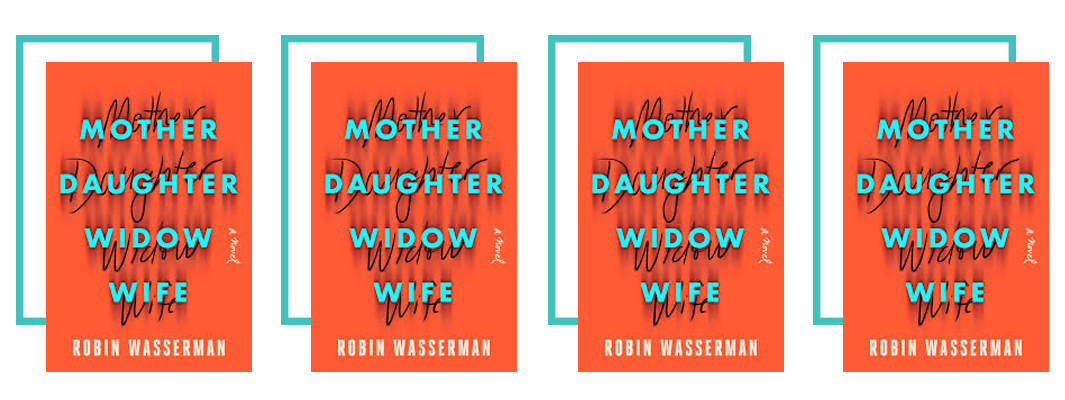
It’s 1999, and a woman appears in Philadelphia. She has no memory of who she is, where she came from, where she was trying to go, or literally anything. She’s given a name — Wendy Doe — and is invited to stay at the Medowlark Institute for Memory Research by its founder, Dr. Benjamin Strauss, so he can study her fugue state. Wendy’s case is assigned to Dr. Strauss’ ambitious fellow, Lizzie Epstein, as they try to understand her memory and current self. But Mother Daughter Widow Wife, Robin Wasserman’s second novel, is much more than just Wendy Doe’s story — it alternates perspectives between Wendy, Lizzie, and Alice, the daughter Wendy left behind. It dives into hard questions of consent and love and power, what it means to remember, and the appeal of anonymity. The main characters — Dr. Strauss and Lizzie — are both Jewish, yet their Jewishness lingers in the background in a realistic and understandable way.
Read if you’re into: memory, psychological books, mysteries. Get it here.
24. The Death of Vivek Oji by Akwaeke Emezi (August)
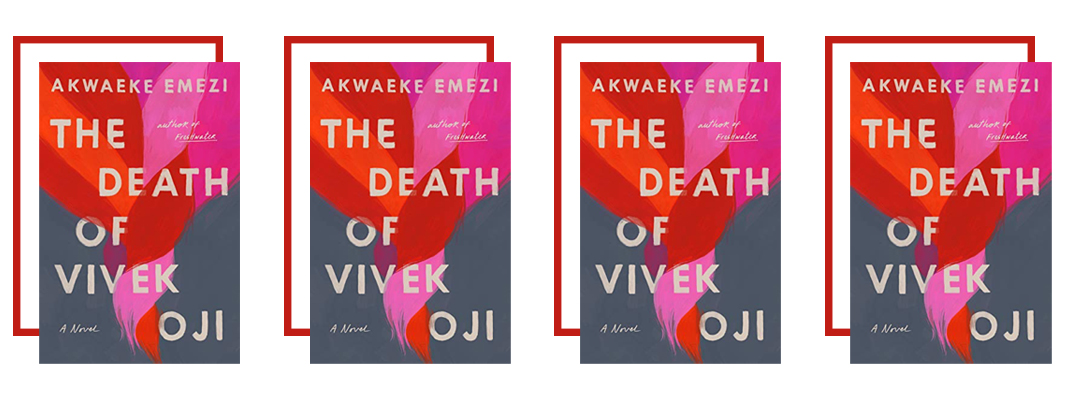
Ugh. My heart hurt reading this one. I mean that in the best way possible: Akwaeke Emezi crafted a beautiful tale of Vivek Oji, who, as we know from the title, has died. However, we don’t find out about how Vivek died until the very, very end; Emezi is an expert at crafting tension and taking us through a kaleidoscope of voices to tell this moving story. Mainly, The Death of Vivek Oji tells the tale of Vivek, a young Nigerian person who is trying to figure out their relationship to their gender; ultimately, the reader understands, Vivek wanted to come out as a woman. Vivek’s dad is Igbo and mom is Indian — she is part of a club of “Nigerwives,” foreign women who have married Nigerian men. Vivek eventually finds solace in the daughters of other Nigerwives, and in the complicated relationship with a cousin, Osita. Vivek’s mother tries to understand what happened to her child, and Vivek’s death, but she comes to realize she never really knew Vivek. A heart-wrenching and powerful read.
Read if you’re into: stories of complicated families and found families and queerness and mourning. Get it here.
25. All the Way to the Tigers by Mary Morris (June)

In Brooklyn in 2008, writer and professor Mary Morris goes ice skating with her husband. There, she falls and fractures her ankle so badly that the trauma surgeon who sees her in the ER thinks she will never walk again. Flash forward to India in 2011, and Morris is determined to see tigers in the wild. Although battling what is likely pneumonia and/or bronchitis, she persists on going out in the Indian winter to try and see a tiger with her guide. The travel memoir is short yet packs a punch, oscillating between Morris’s life-changing injury and her unshakable determination to see a tiger. “He would go on a journey. Not far. Not all the way to the tigers,” writes Thomas Mann in Death in Venice. This quote serves as the epigraph for All the Way to the Tigers (fittingly); she goes on a far journey — to find a tiger, but mainly, to find herself. While at its core, it is the story of a white woman going to India, Morris mainly pulls back from that Eat, Pray, Love trope — aware of her privilege — and focuses on introspection, which is where this memoir shines.
Read if you’re into: memoirs, obvs. Get it here.
26. Cleo McDougal Regrets Nothing by Allison Winn Scotch (August)
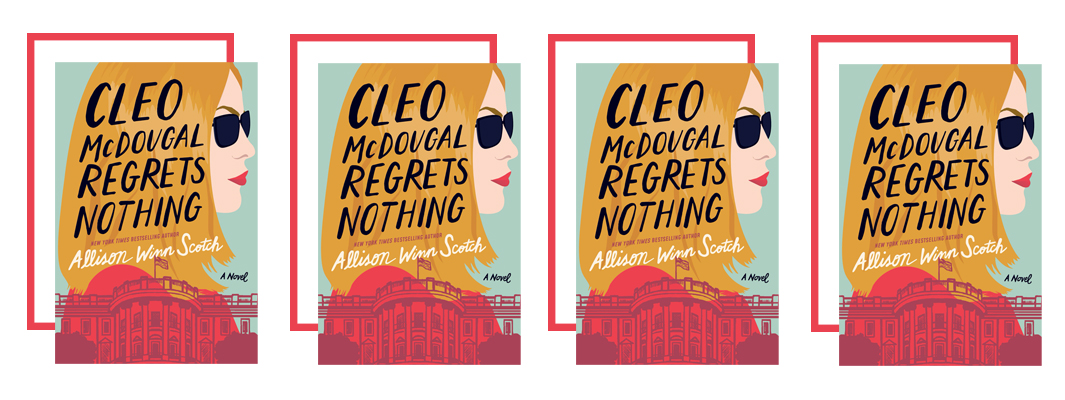
Cleo McDougal is a junior senator from New York. She’s an ambitious single mom who has designs on eventually running for President. That is, until her old best friend publishes an op-ed in a local Seattle paper that says “Cleo McDougal is not a good person.” Soon, Cleo is thrown back into her past and the things she regrets. Jewish author Allison Winn Scotch does an expert job at breaking down the nuanced dynamics of being a woman in power, an ambitious woman, and how misogyny in media plays a huge role in our political discourse. Even though the topics are heavy, the tone is light and fun.
Read if you’re into: dishy novels. Is that still a category? You know what I mean. DISHY 👏 NOVELS 👏. Get it here.
27. The New Wilderness by Diane Cook (August)

In The New Wilderness, there’s the City — overpopulated, smog-filled — and the Wilderness State, where people are forbidden — except a group of 20 people, called the “Community,” who get special dispensation to live as nomads on the land only if they leave no trace. Bea signs up herself and her 5-year-old daughter, Agnes, who is dying of an illness caused by the air quality, and her husband, an academic, Glenn. Bea hopes by bringing her daughter to the Wilderness State, it will cure her. What follows is a tale of a mother and daughter navigating their relationship and the wild and everything in between. It’s an imaginative, dystopian look at what our world could become. I was gripped by how vivid the story was, how expertly Diane Cook got into the dynamics of a group of strangers surviving in the wild, and their relationship with those in power.
What I admired most, however, was how Cook ends her story with a land acknowledgement. “This is a work of fiction set in the future, and any connection to the real world or real people is coincidental. However I visited real places and environments… [and] I would like to acknowledge the Northern Paitue, Shoshone, Klamath, Modoc, Molala, Bannock, and Washoe tribes, whose ancestral lands provided inspiration for where these characters lived and walked.” This is especially meaningful, because so much of Western literature focuses on the wilderness as unexplored or untamed — when, no, there were people living there. There are people living there.
Read if you’re into: dystopias centered on climate change, really well-told stories. Get it here.
28. The Book of Atlantis Black: The Search for a Sister Gone Missing by Betsy Bonner (August)
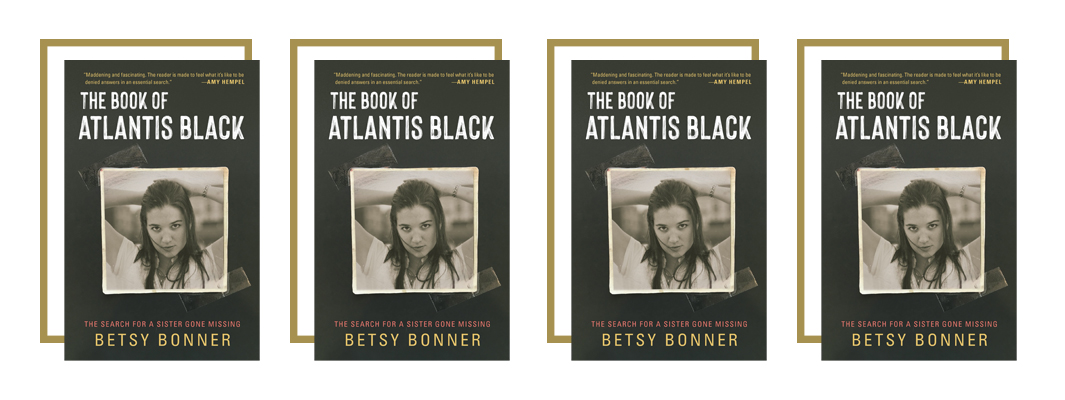
The Book of Atlantis Black begins when Betsy Bonner, the author, tells us that a young woman with her sister’s ID was found dead in a Tijuana hotel on June 25, 2008. The police tell Betsy they do not think the ID matches the dead body, but it was cremated before any identifying details could be gleaned. And so begins this memoir that dives into Betsy’s search for her older sister, Nancy, who later went by Atlantis. There are no easy conclusions, and the grief Betsy feels for Atlantis is clear — you can tell she is grasping for things to make sense about her sister’s life. Atlantis was a musician who struggled with mental illness and drug abuse. There’s a balance between Betsy’s voice, and worry for her sister, and Atlantis’s own paranoia is captured through e-mails and transcriptions of an interview she did in 2008.
Read if you’re into: haunting memoirs. If you’re the type of person drawn to dark and troubled stories, look no further. Get it here.
29. Mother Land by Leah Franqui
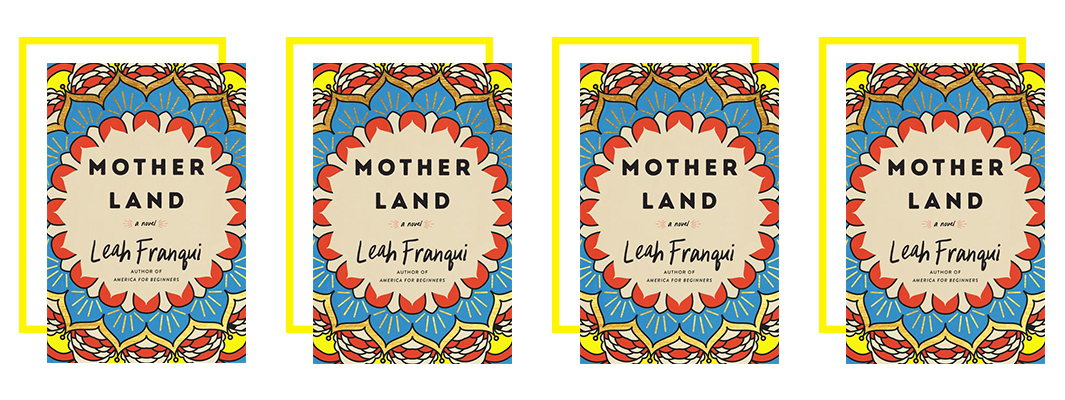
In Mother Land, our protagonist, Rachel Meyer, agrees to move from New York to Mumbai with her Indian-born husband, Dhruv. She’s struggling to adjust to life in Mumbai when Dhruv’s mother, Swati, shows up on their doorstep and announces she has left her husband and plans to stay with them forever. Rachel can’t handle this; she’s already having a hard time, let alone having her mother-in-law live with her!? Soon, Dhruv goes on a business trip and leaves the two women to navigate sharing an apartment. Mother Land alternates between Rachel and Swati’s perspectives, and how each woman is grappling with living with the other.
It’s your classic enemies-to-lovers trope, but instead of ending in romance, it’s friendship. Rachel is intimately aware of her privilege as a white woman living in Mumbai, and actively works to acknowledge it and use it to the benefit of others. Leah Franqui, the author, is a Puerto Rican Jewish woman from Philadelphia who lives with her Kolkata-born husband in Mumbai. You can tell that this book is driven from her experience as a white Jewish woman in Mumbai, and it makes it all the richer.
Read if you’re into: unconventional stories of moms (er, mothers-in-law) and daughters. Get it here.
30. Vera Kelly Is Not a Mystery by Rosalie Knecht (June)
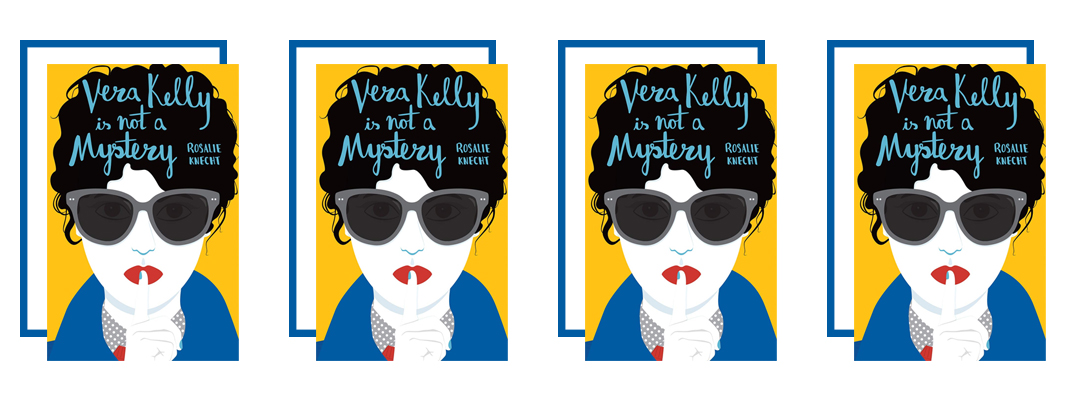
A sequel to Who Is Vera Kelly? (which, go read if you haven’t!), Vera Kelly is not a Mystery continues the story of Vera Kelly, lesbian spy-slash-detective in the 1960s. Both books are a fabulous addition to the spy genre, which faces a severe lack of women. In this installment, Vera has left the CIA and sets up shop as a private detective. The story begins in August 1967, a year after she left the CIA. A case takes her to the Dominican Republic and a boarding school in upstate New York, searching for a lost child, all the meanwhile Vera is trying to figure out her personal life — falling for a bartender at an underground lesbian bar. As Kirkus writes, “A worthy and welcome continuation of a subversive series.” I, personally, can’t wait to see what’s next for Vera.
Read if you’re into: spies, queer stories, the Cold War. Get it here.
31. Finding Freedom: Harry and Meghan and the Making of a Modern Royal Family by Omid Scobie & Carolyn Durand (August)
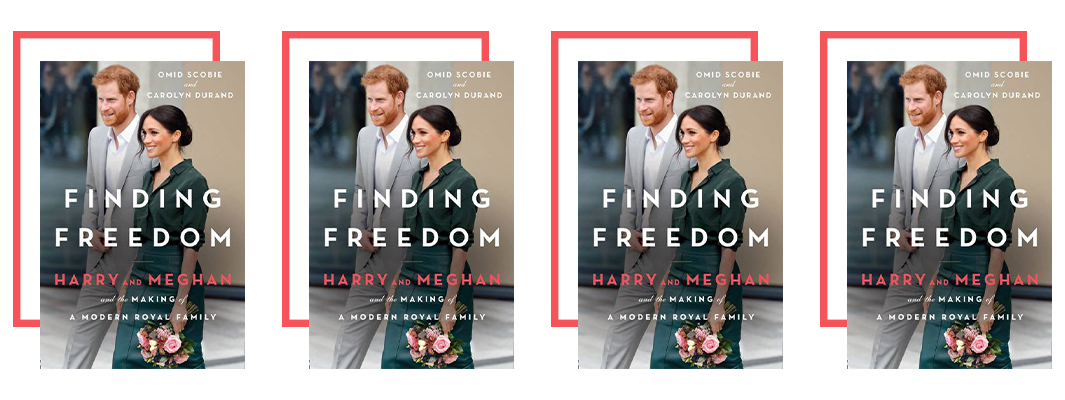
This biography of Meghan Markle and Prince Harry reportedly had the cooperation of the royals themselves. (Representatives are saying they did no interviews.) Let’s just grab the description (because this is the only book on this list that I was not able to get an advanced copy of to read. I wish I did!): “For the very first time, Finding Freedom goes beyond the headlines to reveal unknown details of Harry and Meghan’s life together, dispelling the many rumors and misconceptions that plague the couple on both sides of the pond.” Most anticipated? Hell yes.
Read if you’re into: MEGHAN FREAKIN’ MARKLE, Y’ALL. Get it here.
Happy summer reading! Remember, anything can be a summer book if you want it to be one!
